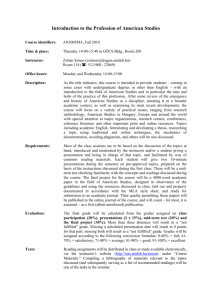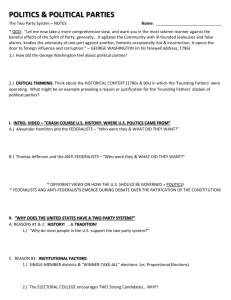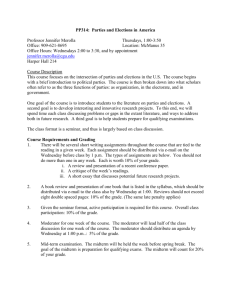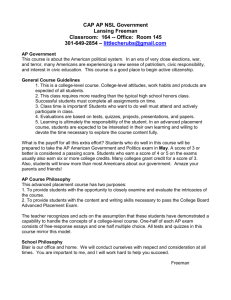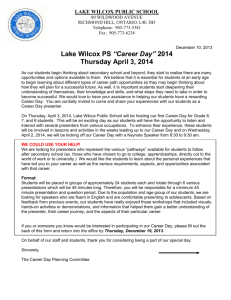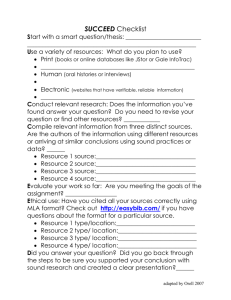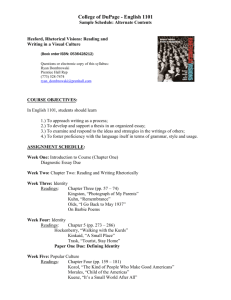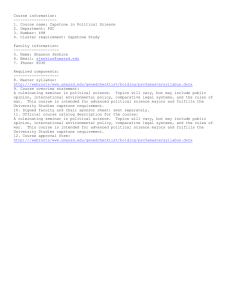- Georgetown University
advertisement
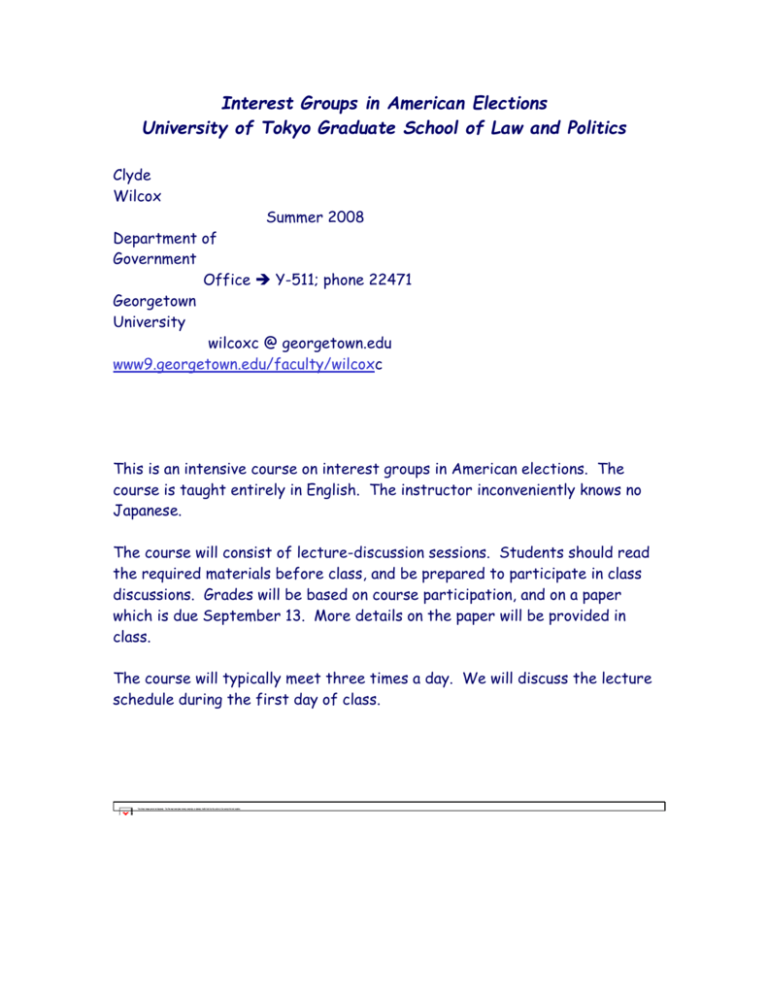
Interest Groups in American Elections University of Tokyo Graduate School of Law and Politics Clyde Wilcox Summer 2008 Department of Government Office Y-511; phone 22471 Georgetown University wilcoxc @ georgetown.edu www9.georgetown.edu/faculty/wilcoxc This is an intensive course on interest groups in American elections. The course is taught entirely in English. The instructor inconveniently knows no Japanese. The course will consist of lecture-discussion sessions. Students should read the required materials before class, and be prepared to participate in class discussions. Grades will be based on course participation, and on a paper which is due September 13. More details on the paper will be provided in class. The course will typically meet three times a day. We will discuss the lecture schedule during the first day of class. Texts: The textbook for the course is Mark Rozell, Clyde Wilcox, and David Madland, Interest Group in American Campaigns: The New Face of Electioneering. For those who are unable to locate a copy of this text, I have loaded an earlier draft of the book here. The chapters are compressed and must be “unzipped.” July 31 Overview 1.) The American political system, Interest Groups and Civil Society 2.) Variety and types of interest groups and their political goals 3.) Movie -- PETA Required readings: Rozell, Wilcox, and Madland, Ch 1 Choose one case study from Biersack, Herrnson, and Wilcox, After the Revolution (For those who cannot find this, I have placed a zip file of the manuscript here). Robert Putnam, “Tuning in Tuning Out: The Strange Disappearance of Social Capital in America” PS: Political Science and Politics 28: 664-683. (You can access this through JSTOR in your university library). Access a web page for one major US interest group o Suggestions US Chamber of Commerce, National Rifle Association, Concerned Women for America (conservative group), National Organization of Women (feminist group), Moveon.Org, AFL-CIO. Recommended readings: Ronald J. Hrebenar, Valerie Ploumpis, and Clive S. Thomas, “What Happened to the Japan Lobby in Washington?” in Cigler and Loomis (eds.) Interest Group Politics (7th edition). Washington, DC: CQ Press. Theda Skocpol, Marshall Ganz, and Ziad Munson, 2000. “A Nation of Organizers: The Institutional Origins of Civic Voluntarism in the United States.” American Political Science Review 94 (3): 527546. (You can access this through JSTOR in your university library). August 1: Interest Group Resources, Constraints, and Strategies (Note that we will not have a late afternoon session today). 1.) Interest Group Resources – What Can Interest Groups Use to Influence Elections 2.) Constraints on Groups: Law, Culture, and Reputation Required Reading: Trevor Potter, “The Current State of Campaign Finance Law.” Thomas E. Mann, “A Collapse of the Campaign Finance Regime” The Forum, 2008. Malbin et al. New Interest Group Strategies http://www.cfinst.org/books_reports/pdf/int_groups_CFIpaper.p df Recommended Readings: Boatright, “Situating the New 527 Organizations in Interest Group Theory.” The Forum 2007 Weissman and Ryan, “Election Activities and Federal Campaign Finance Policy”, http://www.cfinst.org/books_reports/pdf/NonprofitsWorkingPape r.pdf August 4: Interest Groups, Parties, and Candidates 1.) The Uneasy Relationship Between Parties and Interest Groups a. Partisan and bipartisan groups b. Influencing party nominations c. Influencing platforms d. Polarization 2.) Contributing to Candidates a. PACs b. Bundling, fundraising, helping candidates in other ways 3.) Contributing and Lobbying Required Reading: Rozell, Wilcox, and Madland, Ch 2, 3 Dennis Thompson, “Mediated Corruption: The Case of the Keating Five.” American Political Science Review 87 (2) 369391. (Access through JSTOR in your library). Texas State Republican Platform* Mike Bailey, “The Two Sides of Money in Politics: A Synthesis and Framework.” Election Law Journal 3 (4) 2004. 653-669.* Recommended Reading: John Green, James Guth, and Clyde Wilcox, “No Longer Conquerors”* Stephen Ansolabehere, John M. de Figueiredo and James M. Snyder, “Why is There So Little Money in US Politics?” Journal of Economic Perspectives 17: 105-130* August 5: Interest Groups and Voters 1.) Mobilizing members and Voters a. Endorsements, Communicating, Speaking venue b. Voter mobilization --- Rock the Vote, 501 c3 , microtargeting 2.) Issue advocacy and independent expenditures a. Show video of ads 3.) Movie – With God on Their Side Required Readings: Rozell, Wilcox, and Madland, Ch 4 Gerber and Green, “The Effects of Canvassing, Telephone Calls, and Direct Mail on Voter Turnout: A Field Experiment,” American Political Science Review 94: 653-663 (Access through JSTOR in your library). Gary Jacobson, “The Effects of the AFL-CIO’s “Voter Education” Campaigns on the 1996 House Elections.” Journal of Politics 61 (1): 185-194 (Access through JSTOR in your library) Recommended Readings: Ronald Rapoport, Walter Stone, and Alan Abramowitz “Do Endorsements Matter? Group Influence in the 1984 Democratic Caucuses.” American Political Science Review 85 (1) 193-203. (Access through JSTOR in your library) August 6: The Future of Interest Groups in American Elections 1.) Interest Groups in the 2006 and 2008 Elections 2.) Understanding the 2008 Campaigns 3.) Reforms Required Readings: David Magleby and Kelly Patterson, “War Games: Issues and Resources in the Battle for Control of Congress.” Chapter 1 in manuscript* John de Figueiredo and Elizabeth Garrett, “Paying for Politics.” University of Southern California Law School Working Paper 14 (Note that you will need to choose a download location to download this for free, just follow instructions on the page).

